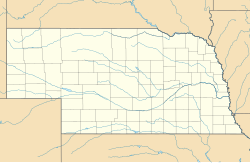Salem Swedish Methodist Episcopal Church | |
 | |
| Nearest city | Axtell, Nebraska |
|---|---|
| Coordinates | 40°27′11″N99°10′42″W / 40.45306°N 99.17833°W |
| Area | 3 acres (1.2 ha) |
| Built | 1883, 1898, 1910 |
| Architectural style | Late Victorian, Late Carpenter Gothic |
| NRHP reference No. | 82003192 [1] |
| Added to NRHP | July 29, 1982 |
Salem Swedish Methodist Episcopal Church (also known as John Fletcher Christian College Chapel) is a Methodist church complex in Kearney County, Nebraska, southwest of Axtell, Nebraska.
The church has served Methodism since its inception, though it has been run by different Methodist denominations throughout its existence. In 1972, the United Methodist Church sold it to the Evangelical Wesleyan Church. [2] The campus of the John Fletcher Christian College and Academy, which was founded in 1968, was moved to this location. [2] John Fletcher Christian College trained ministers to serve in the Evangelical Wesleyan Church, a Methodist denomination aligned with the conservative holiness movement; it had an emphasis on the historic liturgy promulgated by John Wesley in The Sunday Service of the Methodists . The seminary functioned until 1995, the year the wife of its president, Larry Smith, died in an automobile accident. [2]
It was built with Late Victorian/Late Carpenter Gothic style and was added to the National Register of Historic Places in 1982. [1] The listing includes the church, a parsonage (1883), a cemetery, and a school, located on the campus of the John Fletcher Christian College and Academy. [3]

